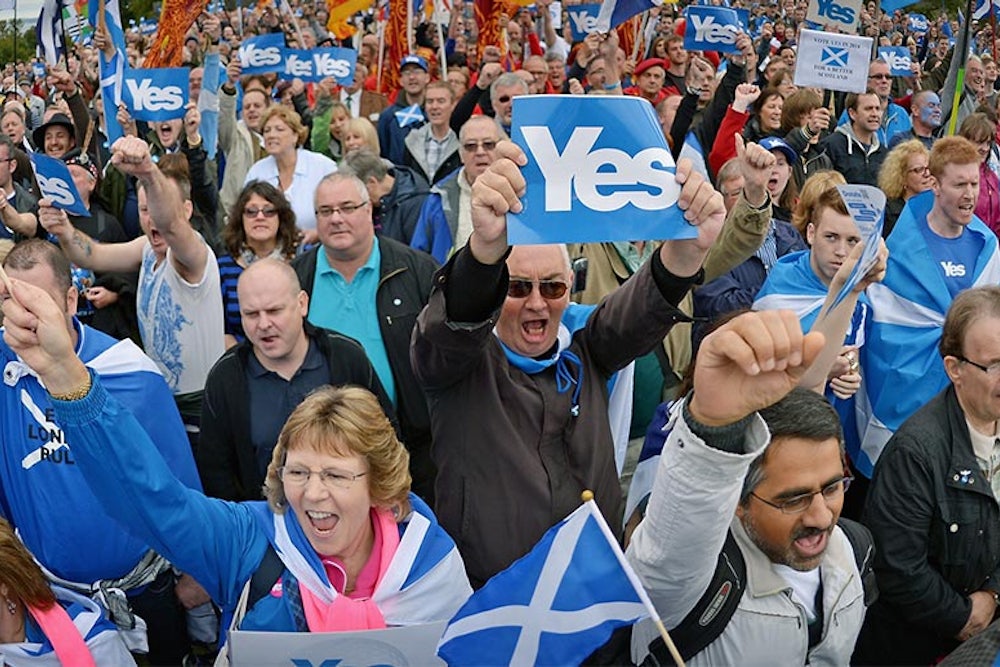I’ve been love-bombed. Finally! It must have been brought on by the increasing support for the Yes campaign in the opinion polls as the independence referendum approaches. “Worrying times,” wrote my English friend. “We don’t want you to go.”
I find all of this concerned talk about the Scots “going” very touching but also perplexing. I’d like to take this opportunity to reassure every lovelorn English person that if we vote to become independent, we won’t be “going” anywhere. We’ll still be here. There will be no customs barriers, no barbed wire along the Tweed. The Edinburgh festivals will still go on, we’ll still send you our smoked salmon, Travis will still play concerts for you, and everyone from south of the border will be as welcome here as they have ever been.
All we are voting for is the right to elect our own governments, raise all of our own taxes and spend them as we decide—just like any normal country. Telling us not to “go” is a bit like saying: “We don’t want you to run your own affairs. You must always have the governments we give you.”
Another misconception is that we are all doomed to ethnic turmoil if Scots vote Yes. This view is epitomized by the historian Simon Schama, who denounced what he called the “tribal identity” of Scottish nationalism. The forces behind calls for independence, he said, were the same as those “happening in dreadful places, causing ethnic and tribal wars and immense massacres."
I read his words and looked out of my window into the peaceful cobbled streets of Edinburgh, where I now live, and wondered how such a renowned historian could get it so wrong. In 25 years as a foreign correspondent, I have seen plenty of ethnic conflicts, from Kosovo and Chechnya to East Timor, and I can assure anyone disturbed by Schama’s babbling that what is happening in Scotland bears as much resemblance to those “dreadful places” as haggis does to Yorkshire pudding. It may not be to everyone’s taste but a ferocious beast it most certainly is not.
It is impossible to judge the mood in Scotland from afar. That is one of the reasons why I decided to return to my homeland a few months ago, after half a lifetime living mainly abroad—not just to experience the fun of this referendum summer but to try to re-understand my country.
A small disclaimer here. My original sin was to have been born in Yorkshire. So steeped was I in that foreign culture that, when my 100 percent Scottish parents brought me north of the border at the age of four and I went to my first international at Murrayfield, I am said to have commented on the gents’ facilities there: “Eeh, what a foony toilet ... there’s moock all over t’floor.” Assimilation was rapid. When we were visited by Yorkshire friends a year later, I couldn’t understand a word they said.
My next 20 years were in Scotland (I didn’t even visit London until I was at university) and I have spent the past 30-odd years, while living abroad, tirelessly insisting in a variety of foreign tongues there is actually a wee country called Scotland and it is definitely not a part of England.
So, what does it mean to be Scottish? You certainly won’t find out from any of the speeches being made during this referendum campaign. The SNP and the wider Yes campaign studiously avoid mentioning precisely what one might expect to be central to a national independence movement: identity. This is what kept my Scottish flame alight through decades of living abroad—but which dare not speak its name at home for fear of being branded nationalist or anti-English.
But nationalism does not have to be exclusive, aggressive, chauvinistic, or condescending. It can be of the welcoming kind described by Kathleen Jamie in her wonderful poem inscribed on the monument to the Battle of Bannockburn. Ostensibly it commemorates the Scots’ defeat of the English in 1314 but the poem invites all incomers who take the land “to heart” to make it their own.
Independence is not about erecting barriers. The Scots and English would still be the closest allies. Yet independence would give us a chance to build a country that better reflects the identity and priorities—the political culture, if you will—of the majority of those who live here (both “ethnic” Scots and those who have come here and taken the land to heart).
Over the centuries of the union with England, we have preserved our culture, music, literature, dialects, customs, laws, and Church—and all of that has created a set of Scottish values. Most of us are what I would call “Burnsian” in our scorn of privilege and our pursuit of fairness and would rather spend taxes on schools and hospitals than cosset bankers or project our might around the world with nuclear missiles and foreign wars. These are rather high-minded values and they rarely guide the governments we get lumbered with in Westminster.
I see nothing wrong with proclaiming such an identity with pride and I find it depressing that, instead, the campaign has focused on whether we might be £500 per head better or worse off, or how we will cope with all that oil in the North Sea, which seems to be such a burden. I will vote for independence this month not because I am a nationalist but because I am a social democrat; not because I hate the English (how could I, having lived in England for years and worked for most of my life with English people?) but because I am Scottish and believe that, because of our national identity and values, we will try to run our country differently—and better—if we are able to do it in the way we choose.
This article originally appeared in the New Statesman.
